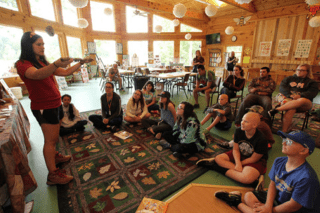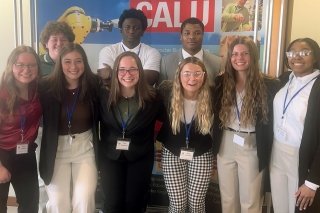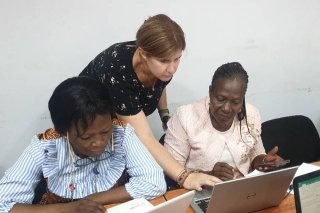Honors research leads to new summer curriculum for Camp Victory
Posted:

A new anthropology program with an archaeology twist was brought to Camp Victory this summer as part of its Nature Center activities, courtesy of a Bloomsburg University senior’s honors research.
Summer intern Anne Snyder — a triple major in anthropology, French and psychology — created a curriculum in conjunction with Susan Dauria, professor of anthropology, to teach children about local Native American Culture, history and archaeology. The new curriculum was utilized as part of Camp Victory’s Nature Center activities.
“Watching the gears in a child’s brain start to turn, as they ask question after question becoming more and more inquisitive, made me feel like I was making a difference in their life,” Snyder said. “Perhaps I’m sparking an interest in their future field of study. Maybe I was giving them an experience which will spur them to pursue a specific path. Either way, giving a child an experience they may not normally have access to was an honor.”
The setting also added a special touch to Snyder’s summer experience.
“I feel privileged to have had a front row seat to observe children forgetting about their special needs, whether they were engaged in archaeology, playing with the animals at the Nature Center, or having fun with their friends,” Snyder said. “I loved being a part of the Camp Victory experience — a place where children can learn and grow, a place where their special need does not mean they cannot enjoy everything a summer camp has to offer.”
The experience served as both Snyder’s honors project and a research practicum she needs as part of her anthropology major (research track). The creation of this curriculum is part of the transitioning of Dauria’s archaeology summer camp program (that began in 2010 with Quest), to Camp Victory.
“I’ve always had an interest in local Native American Culture,” Snyder said. “I think the intrigue first started when I visited Bandelier National Monument in New Mexico, and I became fascinated with the ways in which Native Americans overcame their living environment to thrive and flourish.”
Snyder said she felt there was a need to teach this local history to children based on her own educational experience growing up.
“I was homeschooled for the first four years of my education, and I learned more about Native Americans in those years than I ever did in the following years going to a local public school,” Snyder said. “I think learning about local Native American history can help encourage diversity and acceptance, because it teaches children that people in the entire world around are the same; they are all looking for different ways to survive.”
Snyder’s program will be a continuation of involvement of BU anthropology students in archaeology and anthropology education for the local community, according to Dauria, specifically to use anthropology and archaeology as a hands-on learning opportunity for children and teens attending Camp Victory, which hosts different weekly groups throughout the summer.
The experience also left a lasting impression — and influence — on Snyder.
“I was planning on going to graduate school for psychology, but now I think teaching is a large part of my life I would like to continue,” Snyder said. “Although I have not decided for certain what I will be teaching, I think being able to educate is now a goal in my life.”



